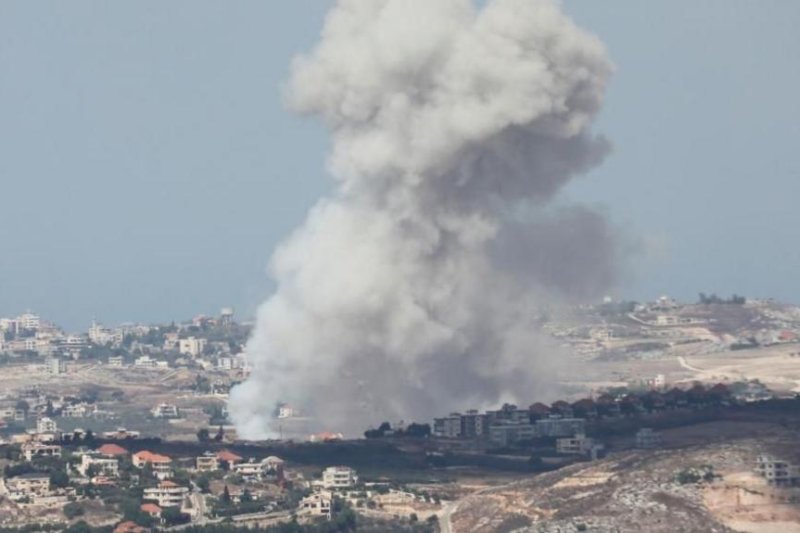Lebanon Says 182 Killed in Deadliest Day of Israel-Hezbollah Conflict in Past Year
Israel attacked hundreds of Hezbollah targets on Monday in airstrikes that Lebanese health authorities said killed at least 182 people, making it the deadliest day in Lebanon in nearly a year of conflict.
After some of the heaviest cross-border exchanges of fire since the conflict flared, Israel warned people to evacuate areas where it said the armed group was storing weapons.
After almost a year of war against Hamas in Gaza on its southern border, Israel is shifting its focus to its northern border, from where Iran-backed Hezbollah has been firing rockets into Israel in support of its ally Hamas.
"We are deepening our attacks in Lebanon, the actions will continue until we achieve our goal to return the northern residents safely to their homes," Israeli Defence Minister Yoav Gallant said in a video published by his office on Monday.
"These are days in which the Israeli public will have to show composure."
Cars sit in traffic as they flee the southern villages amid ongoing Israeli airstrikes, in Sidon, Lebanon on Monday. (Mohammed Zaatari/The Associated Press)
He was speaking after the Israeli military targeted Iran-backed Hezbollah in Lebanon's south, eastern Bekaa Valley and northern region near Syria.
Lebanon's Health Ministry said at least 182 people had been killed, including women, children and medics, and more than 727 wounded in Israel's strikes on Monday.
Israeli army spokesperson Avichay Adraee said on X that more than 300 Hezbollah targets had been struck so far after earlier warning that airstrikes were imminent on houses in Lebanon where "Hezbollah hid weapons."
In response, Hezbollah said it had launched rockets at Israeli military posts.
'Freaking out' in Beirut
Residents of southern Lebanon received calls from a Lebanese number ordering them to immediately distance themselves 1,000 metres from any post used by Hezbollah, a Reuters reporter in the south, who received the call, said.
Evacuation calls have been received on phones as far as the Lebanese capital, Beirut.
Lebanon's information minister Ziad Makary said his ministry had received a similar call ordering the building to evacuate, but said the ministry would do no such thing. "This is a psychological war," Makary told Reuters.
A Lebanese person living in Beirut's Manara area told Reuters that her family received a call on their landline.
"So they were freaking out, I am freaking out as well because we thought somehow the area we live in is safe because we're surrounded by ambassadors," said the person.
Lebanon received more than 80,000 suspected Israeli call attempts asking people to evacuate their areas, the head of telecoms company Ogero, Imad Kreidieh, told Reuters on Monday.
Civilian houses used for war, IDF says
Asked by reporters about a possible Israeli ground incursion into Lebanon, Israeli military spokesperson Rear Adm. Daniel Hagari said "we will do whatever is needed" in order to return evacuated residents of northern Israel to their homes safely, a war priority for the Israeli government.
The latest attacks came amid some of the heaviest cross-border exchanges of fire in a conflict raging alongside the war between Israel and Hamas in Gaza.
Hagari said that Hezbollah over the years has stashed weapons, including cruise missiles, in houses and buildings throughout southern Lebanon, and called on residents to stay away from these sites.
Hagari presented in a media briefing an aerial video of what he described as Hezbollah operatives trying to launch cruise missiles from a civilian house in Lebanon, and the subsequent Israeli strike moments before it was launched.
Reuters reporters in the southern port city of Tyre could hear Israeli warplanes flying low over southern Lebanon and hear a series of airstrikes nearby.
Rescuers sift through the rubble on Monday as they search for people still missing at the site of last week's Israeli strike in Beirut's southern suburbs. (Hassan Ammar/The Associated Press)
Hezbollah's al-Manar television reported Israeli airstrikes targeting the outskirts of many towns and villages in the south and the Bekaa Valley in eastern Lebanon. Footage showed columns of smoke rising over the south.
The war in Gaza began with Hamas's Oct. 7 attack into Israel, in which Palestinian militants killed some 1,200 people and took around 250 hostage, according to Israeli tallies.
They are still holding around 100 captives, a third of whom are believed to be dead. Gaza's Health Ministry says over 41,455 Palestinians have been killed. It does not say how many were fighters but says women and children make up over half of the dead.
In addition to striking the Bekaa Valley region of eastern Lebanon, warplanes also carried out airstrikes on the Hermel area in northern Lebanon, Hezbollah's al-Manar reported.
Hezbollah and Israel exchanged heavy fire into Sunday, as the Lebanese militant group sent rockets deep into northern Israeli territory after facing intense bombardment.
'We have entered a new phase'
Hezbollah deputy chief Naim Qassem told mourners at the funeral of one of the group's commanders killed last week in Beirut: "We have entered a new phase, the title of which is the open-ended battle of reckoning."
Hezbollah has come under pressure since thousands of pagers and walkie-talkies used by Hezbollah members exploded last week.
The attack, an unprecedented breach of security, was widely blamed on Israel, which has not confirmed or denied responsibility.
The conflict — which has escalated sharply in the past week — has raged since Hezbollah opened a second front against Israel, saying it was acting in support of Palestinians facing an Israeli offensive further south in Gaza.













